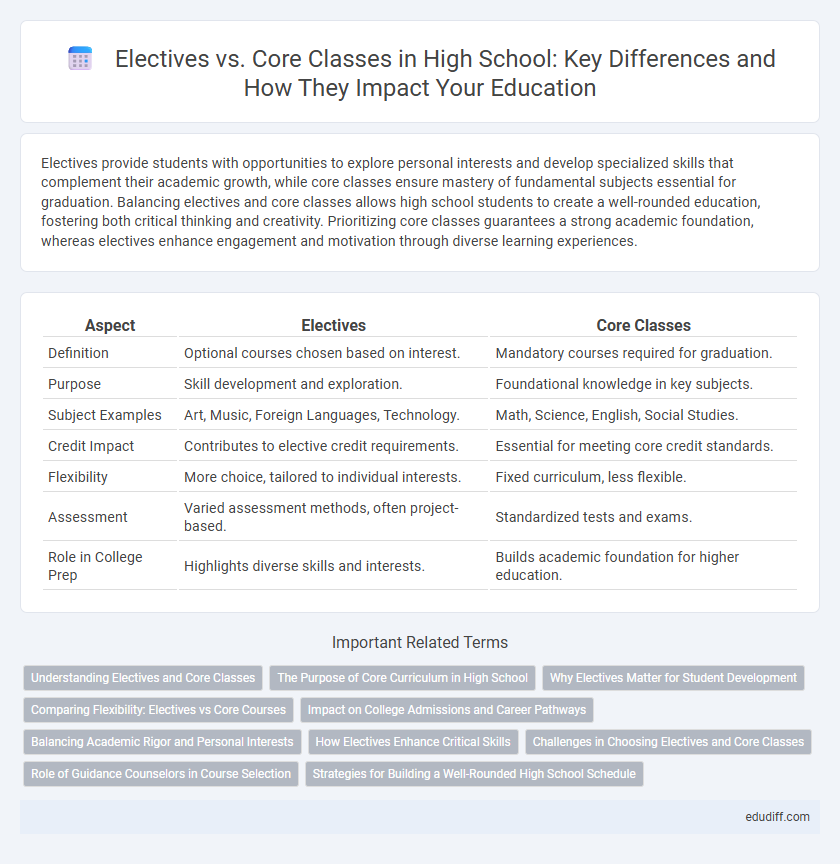Electives provide students with opportunities to explore personal interests and develop specialized skills that complement their academic growth, while core classes ensure mastery of fundamental subjects essential for graduation. Balancing electives and core classes allows high school students to create a well-rounded education, fostering both critical thinking and creativity. Prioritizing core classes guarantees a strong academic foundation, whereas electives enhance engagement and motivation through diverse learning experiences.
Table of Comparison
| Aspect | Electives | Core Classes |
|---|---|---|
| Definition | Optional courses chosen based on interest. | Mandatory courses required for graduation. |
| Purpose | Skill development and exploration. | Foundational knowledge in key subjects. |
| Subject Examples | Art, Music, Foreign Languages, Technology. | Math, Science, English, Social Studies. |
| Credit Impact | Contributes to elective credit requirements. | Essential for meeting core credit standards. |
| Flexibility | More choice, tailored to individual interests. | Fixed curriculum, less flexible. |
| Assessment | Varied assessment methods, often project-based. | Standardized tests and exams. |
| Role in College Prep | Highlights diverse skills and interests. | Builds academic foundation for higher education. |
Understanding Electives and Core Classes
Electives in high school offer students opportunities to explore interests beyond core academic subjects like math, science, English, and social studies, allowing for personalized learning experiences and skill development in areas such as art, music, or technology. Core classes are mandatory and provide foundational knowledge essential for graduation and college readiness, focusing on critical thinking, literacy, and problem-solving skills. Understanding the distinction between electives and core classes helps students balance their academic requirements with personal growth and career exploration.
The Purpose of Core Curriculum in High School
Core curriculum in high school establishes foundational knowledge in essential subjects such as English, mathematics, science, and social studies, ensuring students develop critical thinking and problem-solving skills. These courses prepare students for standardized tests and college readiness, aligning with state education standards and graduation requirements. A well-rounded core curriculum supports academic growth and equips students with the competencies needed for advanced studies and career opportunities.
Why Electives Matter for Student Development
Electives provide students with opportunities to explore diverse interests and develop essential skills beyond the standardized curriculum. These courses foster creativity, critical thinking, and personal growth by allowing students to engage in subjects like arts, technology, and languages. Electives contribute to well-rounded education, improving student motivation and preparing them for varied career paths and real-world challenges.
Comparing Flexibility: Electives vs Core Courses
Electives offer greater flexibility by allowing students to explore diverse interests and tailor their schedules to personal strengths or passions, unlike core classes which have a fixed curriculum essential for graduation requirements. Core courses provide a structured foundation in subjects like math, science, and English, ensuring students acquire critical knowledge and skills. Flexibility in electives enables students to enhance college applications and career readiness through exposure to specialized topics beyond mandatory coursework.
Impact on College Admissions and Career Pathways
Core classes, such as math, science, and English, form the foundation of high school education and are critical in meeting college admission requirements and demonstrating academic rigor. Electives provide opportunities to explore interests and develop specialized skills, which can enhance college applications by showcasing well-roundedness and unique talents relevant to career pathways. A balanced combination of strong core courses and strategic electives can improve both college admission prospects and alignment with future career goals.
Balancing Academic Rigor and Personal Interests
Balancing academic rigor and personal interests in high school requires students to strategically select a mix of core classes--such as mathematics, science, English, and social studies--that fulfill graduation requirements and build foundational skills, alongside electives that foster creativity, critical thinking, and passion development in areas like art, music, technology, or foreign languages. Prioritizing both components supports well-rounded academic growth, improves college readiness, and enhances student engagement by allowing exploration of diverse subjects while maintaining essential competencies. Effective time management and self-assessment enable students to navigate course loads that challenge their intellectual capabilities without overwhelming their personal well-being.
How Electives Enhance Critical Skills
Electives in high school play a crucial role in enhancing critical skills such as problem-solving, creativity, and communication by offering diverse subject matter beyond the standard core curriculum. Courses like art, music, or computer science encourage analytical thinking and innovative approaches, which are essential for real-world challenges. Electives also provide opportunities for students to develop specialized knowledge and interpersonal skills that complement core academic learning.
Challenges in Choosing Electives and Core Classes
Choosing electives versus core classes poses challenges in balancing graduation requirements with personal interests and career goals. Students must navigate limited scheduling availability, prerequisite constraints, and the pressure to maintain a strong GPA in core subjects while exploring diverse electives. Effective academic advising and time management are crucial to optimizing class selection and achieving both academic and personal growth.
Role of Guidance Counselors in Course Selection
Guidance counselors play a critical role in balancing students' course selection between electives and core classes by aligning choices with academic goals and career aspirations. They analyze student performance data, interests, and graduation requirements to recommend a personalized schedule that optimizes skill development and college readiness. Effective counseling ensures students meet mandatory state standards while exploring elective opportunities that enhance creativity, critical thinking, and specialized knowledge.
Strategies for Building a Well-Rounded High School Schedule
Balancing electives and core classes ensures a diverse high school schedule that supports both academic requirements and personal interests. Prioritizing core subjects like math, science, and language arts builds foundational skills while selecting electives in arts, technology, and foreign languages enhances creativity and college readiness. Strategic course planning with counselor guidance optimizes credit fulfillment and exposure to various fields, fostering a well-rounded educational experience.
Electives vs Core Classes Infographic

 edudiff.com
edudiff.com